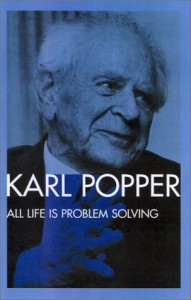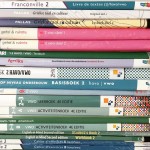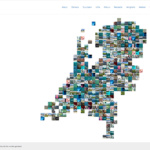If you have ever wondered what knowledge looks like - check this image. This is…
Presentational knowledge and Karl Popper
It gave me a few new words, quote “what art transmits is “presentational knowledge”. This differs from the “discursive knowledge” of philosophy and science, which is knowledge that can be put into words, written down, analyzed, legitimized. Presentational knowledge cannot be captured in words because it is too new and unknown – still too intuitive, too instinctive, too somatic. It is therefore referred to with images or provoced through action.”
Wiki: The term somatic (from the Greek σωματικός) refers to cells of the body, rather than gametes (eggs or sperm). In humans, somatic cells contain two copies of each chromosome (diploid), whereas gametes only contain one copy of each chromosome (haploid).
The article also served to give the term “interactive art’ added meaning for me. Interactive art is not only art in which ‘the public’ participates, the participants also change something about the artwork. In the example of Ulrieke Gabriels ‘Terrain” (1994) the activity of thinking drives the (in)activity of robots – less alpha waves going on inside the human head leads to more activity from the robots.
Quote: “the impossibility of reflection is a necessary condition for interacting with interactive art, but at the same time it makes a theme of the distance that must be overcome in this artform for there to be interaction, precisely through the fact that in this piece the art cannot be touched”. This links to my theme of ‘play exploration is intuitive and pre-verbal’. In my experiments the problem usually is to get ‘the public’ to jump into the thing both feets first. I encounter three types of problems really.
- One: is my interactive environment (seen as) a work of art. or rather vice versa: is my art seen as an interactive environment.
- Two: how to attract the attention of potential participants, make them curious.
- Three: how to overcome their conditioning never to touch works of art.
I create these problems myself, of course, because I want to operate in an art context and also because I don’t want to put up a sign telling people what they can/should/must do – that would be cheating. I want the environment to be explored, not by the book or using a manual but the way kids do, and using all the senses. Note: find out why this is important to me.
 My other big question is: what about validation of presentational knowledge, then? In the sciences, knowledge is presumed valid until proven otherwise. Theories are only valid until something or someone happens along that invalidates the theory, in which case a better theory takes its place, a sort of darwinian process called falsification. All scientists experiment like eager beavers, trying to up-end their theories. In Delft, Karl Popper was a great name.
My other big question is: what about validation of presentational knowledge, then? In the sciences, knowledge is presumed valid until proven otherwise. Theories are only valid until something or someone happens along that invalidates the theory, in which case a better theory takes its place, a sort of darwinian process called falsification. All scientists experiment like eager beavers, trying to up-end their theories. In Delft, Karl Popper was a great name.
Wiki: Sir Karl Raimund PopperCH, FRS, FBA (28 July 1902 – 17 September 1994) was an Austrian and British[1] philosopher and a professor at the London School of Economics.[2] He is considered one of the most influential philosophers of science of the 20th century,[3] and also wrote extensively on social and political philosophy. Popper is known for repudiating the classical observationalist/inductivist account of scientific method by advancing empirical falsification instead; for his opposition to the classical justificationist account of knowledge which he replaced with critical rationalism, “the first non justificational philosophy of criticism in the history of philosophy”[4], and for his vigorous defense of liberal democracy and the principles of social criticism that he came to believe made a flourishing “open society” possible.,
Karl Popper
| « “It has great capabilities, my lord, great capabilities” | <-- previous post | next post --> | Find a legend for a girl » |
|---|







